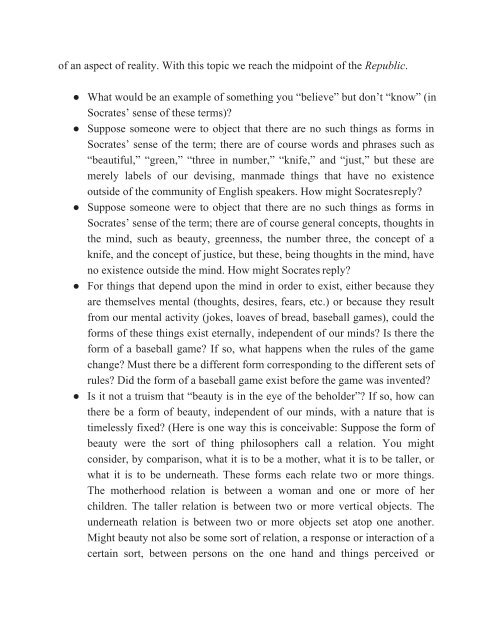The Intelligent Troglodyte’s Guide to Plato’s Republic, 2016a
The Intelligent Troglodyte’s Guide to Plato’s Republic, 2016a
The Intelligent Troglodyte’s Guide to Plato’s Republic, 2016a
You also want an ePaper? Increase the reach of your titles
YUMPU automatically turns print PDFs into web optimized ePapers that Google loves.
of an aspect of reality. With this <strong>to</strong>pic we reach the midpoint of the <strong>Republic</strong>.<br />
What would be an example of something you “believe” but don’t “know” (in<br />
Socrates’ sense of these terms)?<br />
Suppose someone were <strong>to</strong> object that there are no such things as forms in<br />
Socrates’ sense of the term; there are of course words and phrases such as<br />
“beautiful,” “green,” “three in number,” “knife,” and “just,” but these are<br />
merely labels of our devising, manmade things that have no existence<br />
outside of the community of English speakers. How might Socrates reply?<br />
Suppose someone were <strong>to</strong> object that there are no such things as forms in<br />
Socrates’ sense of the term; there are of course general concepts, thoughts in<br />
the mind, such as beauty, greenness, the number three, the concept of a<br />
knife, and the concept of justice, but these, being thoughts in the mind, have<br />
no existence outside the mind. How might Socrates reply?<br />
For things that depend upon the mind in order <strong>to</strong> exist, either because they<br />
are themselves mental (thoughts, desires, fears, etc.) or because they result<br />
from our mental activity (jokes, loaves of bread, baseball games), could the<br />
forms of these things exist eternally, independent of our minds? Is there the<br />
form of a baseball game? If so, what happens when the rules of the game<br />
change? Must there be a different form corresponding <strong>to</strong> the different sets of<br />
rules? Did the form of a baseball game exist before the game was invented?<br />
Is it not a truism that “beauty is in the eye of the beholder”? If so, how can<br />
there be a form of beauty, independent of our minds, with a nature that is<br />
timelessly fixed? (Here is one way this is conceivable: Suppose the form of<br />
beauty were the sort of thing philosophers call a relation. You might<br />
consider, by comparison, what it is <strong>to</strong> be a mother, what it is <strong>to</strong> be taller, or<br />
what it is <strong>to</strong> be underneath. <strong>The</strong>se forms each relate two or more things.<br />
<strong>The</strong> motherhood relation is between a woman and one or more of her<br />
children. <strong>The</strong> taller relation is between two or more vertical objects. <strong>The</strong><br />
underneath relation is between two or more objects set a<strong>to</strong>p one another.<br />
Might beauty not also be some sort of relation, a response or interaction of a<br />
certain sort, between persons on the one hand and things perceived or


















